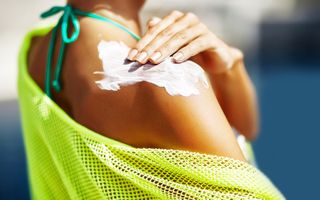Is Expired Sunscreen Better Than No Sunscreen?

You've just claimed a spot on the beach; the sun is rising overhead, and you're looking forward to a relaxing day of sea and sun.
And speaking of sun — you mustn't forget to apply a generous layer of protective sunblock. But when you reach for your tube of sunscreen, you notice that it's long past the stamped expiration date.
Should you use it anyway? [5 Things You Didn't Know About Sunscreens]
Sunscreens typically provide protection with active ingredients that absorb or reflect ultraviolet (UV) radiation, such as zinc oxide or titanium dioxide, and so-called "broad spectrum" products block out two types of potentially damaging UV radiation — UVA and UVB rays, the Melanoma Research Foundation reported.
Most sunscreens will remain effective up to three years after the container is opened — unless the brand's expiration date says otherwise, according to the Mayo Clinic. However, storage in hot places or exposure to moisture can break down a sunscreen's components and reduce its effectiveness even before it's "officially" expired, Dr. Lauren Ploch, a dermatologist, told Live Science in an email.
"Any ingredient in a personal care product — even inactive ones, like emulsifiers and preservatives — can degrade over time," Ploch explained. "This degradation is often accelerated by suboptimal storage conditions, so storing sunscreen in a hot car may make it ineffective even before its expiration date."
Expired sunscreen may be less effective at blocking UV rays, raising the likelihood of sunburn and an increased risk of skin cancer. But heavy creams, which generally provide better coverage and sun protection than gels or sprays, can still provide a shield between skin and sun, even if the sunblock is expired, Ploch said.
Sign up for the Live Science daily newsletter now
Get the world’s most fascinating discoveries delivered straight to your inbox.
"Expired sunscreen may be better than no sunscreen, especially if the active ingredient is a physical sunblock like zinc oxide or titanium dioxide," she said.
However, sunscreens can differ widely in their composition of active ingredients and inactive ingredients, and the storage history of individual containers of sunblock can vary even more. Therefore, it's impossible to say for sure how effective an expired tube of sunscreen could be, and users would be far safer seeking an unexpired option if one is available, she said.
"I recommend borrowing sunscreen from someone else on the beach or going to a nearby store to buy something. Even small convenience stores and gas stations stock sunscreens now," Ploch said.
If you're caught without any sunscreen whatsoever, fabric can provide some protection from the sun, especially if the fabric is specially woven or treated to screen out ultraviolet rays, Ploch told Live Science. In clothing, a UPF (ultraviolet protection factor) rating describes how effectively clothing will protect you, much as SPF (sun protection factor) numbers represent the effectiveness of sunscreen.
But even UPF-treated fabric doesn't provide 100 percent protection, "so it's important to wear both sunscreen and sun-protective clothing," Ploch said.
Original article on Live Science.

Mindy Weisberger is an editor at Scholastic and a former Live Science channel editor and senior writer. She has reported on general science, covering climate change, paleontology, biology, and space. Mindy studied film at Columbia University; prior to Live Science she produced, wrote and directed media for the American Museum of Natural History in New York City. Her videos about dinosaurs, astrophysics, biodiversity and evolution appear in museums and science centers worldwide, earning awards such as the CINE Golden Eagle and the Communicator Award of Excellence. Her writing has also appeared in Scientific American, The Washington Post and How It Works Magazine.
